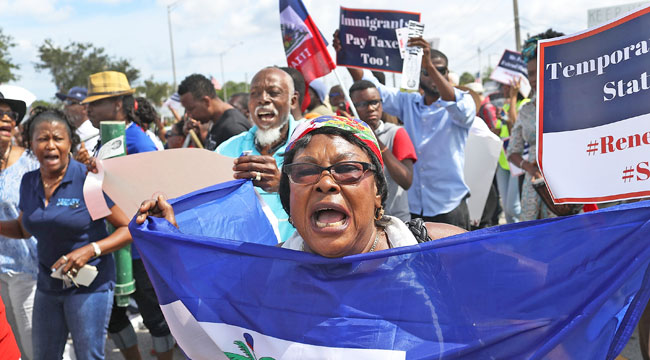
President Trump is giving 59,000 Haitians the boot, revoking the Temporary Protected Status (TPS) that has allowed them to build lives here in the United States ever since the devastating 2010 earthquake that wrecked their home country. Since then, those thousands of Haitians have not only started careers and families here, they’ve even bought homes and invested in the American dream. Now they have until 2019 to make other plans.
The problem is that Haiti hasn’t recovered much in the past seven years. It was already devastatingly poor before the earthquake, and then it was hit again in 2016 by Hurricane Matthew. Representative Illean Ros-Lehtinen took to Twitter Monday evening to share what she saw on the ground in Haiti after both disasters, writing that she “can personally attest that Haiti is not prepared to take back nearly 60,000 TPS recipients under these difficult and harsh conditions.”
I travelled to #Haiti after the earthquake in 2010 and after hurricane Matthew in 2016. So I can personally attest that #Haiti is not prepared to take back nearly 60,000 #TPS recipients under these difficult and harsh conditions.
— Ileana Ros-Lehtinen (@RosLehtinen) November 21, 2017
But the Department of Homeland Security has accompanied their decree with a sunnier picture of conditions in Haiti. “Significant steps have been taken to improve the stability and quality of life for Haitian citizens,” said an official statement, “and Haiti is able to safely receive traditional levels of returned citizens.” But Rep. Ros-Lehtinen isn’t the only one who disagrees.
Florida Senator Bill Nelson has added his two cents while advocating for “a permanent legislative solution” for the Haitians who came here. Such a far-ranging immigration policy would need to address more than just the plight of the Haitians. There are also thousands of Nicaraguans, Salvadorans, Dominicans, and other groups from the Caribbean and Central America who are here under TPS protections, and the Trump administration is trying to shake them off the mainland, too.
TPS communities are terrified, and already Haitians are desperately fleeing north to seek asylum in Canada. They’re afraid not only of having to return to Haiti, but also of having their families split up — those 59,000 Haitian immigrants are raising some 30,000 children with U.S. citizenship. Meanwhile, those who stayed in Haiti are worried about what will happen to fragile Haitian economy when this decision dents the money sent home from the mainland, which accounts for an estimated 25% of Haiti’s GDP. Indeed, many families who had gotten back on their feet are now faced with having to start all over, and this time, it’s not because of another natural disaster.
(Via New York Times)
